Kathryn Mockler's Blog, page 35
May 23, 2023
Deborah Dundas | Issue 27, 2023
WHEN I WAS in grade eight, we were evicted from our subsidized apartment in one of the poorer areas of Toronto. I was a kid, I don’t know the reasons and straight answers can be hard to come by. What I do know is that I came home from school to find a yellow sheet of paper from the Sherriff’s office taped to the door and that my key wouldn’t fit in the lock. I sat down in the hallway, crying, wondering what to do.
Kind neighbours took me in as I tried to get hold of my mother to tell her what had happened. Within a few days our possessions were thrown into boxes, tossed into the back of our ancient blue Rambler or left behind. We moved to a much smaller apartment at the other end of the city, and I started at yet another school. When the possibility of subsidized housing doesn’t exist for those in crisis, the choices for affordable living are limited.
The new apartment was dark and damp. Where, a few weeks before, we would have taken an elevator up to a carpeted hallway, and the only steps were down to the sunken living room, now we took old tiled stairs down to a dark, echoey basement hallway, our apartment only a few doors from the rattle of the laundry room’s washers and dryers. In the kitchen, dirt gathered where the cor- ners of the old linoleum had curled and broken. I looked out the bedroom window, my eyes level with the street. A chip in the paint showed layers of lives coloured in blue, white, pink, beige, yellow, and the muddy green that now covered the walls.
But the part of the city we moved to was nicer, with more single-family homes and leafy streets; the school I went to was better, too, with teachers who worked to include me in class and in extra-curricular activities, even though I started halfway through the school year. I joined the after-school choir, ran in the city cross-country meet, came amongst the top in my school on a standardized test, read aloud in class stories I’d written—and people liked them. One day, a friend introduced me to a boy who smelled of clean laundry. He asked me where I lived. I told him. “You live there?” he asked, surprised. He lived in one of the post-war bungalows that populated the rest of the area; the kind of home where, I imagined, he lived a life free from the drudgery and dirt and abuse and addiction and eccentric characters crowded into our little brown building. This was a small moment, but it’s the sort of moment that helped me see other possibilities: even if he was surprised at where I lived, I could hold my own. Those little moments are the kind that help lift you up if you let them.
***
WHEN WE TALK about class, part of what we talk about is our expectations: of what type of education or job we might aspire to; of networks and connections—whether through family, friends, or work—that can help us; possibly of owning a home. All these factors help provide a safety net, a sense of comfort, knowledge that you have the skills you need, someone to help you out, or a cushion of equity in your home or investments if the going gets tough.
Canadians still overwhelmingly aspire to home ownership—according to a 2016 poll, 85 percent feel it is a priority.1 But, as home prices have risen and it’s become more difficult for young people to save for a down payment, the possibility of home ownership is now often dependent on parental help or an inheritance. In Ontario, 40 percent of parents of younger homeowners assisted their children financially, with the average gift being more than $70,000.2
“Boomers have been paying off their homes,” the Globe and Mail reported in March 2021, “and now have a lot of money to play with. And give away.”3 They’ve also been on the receiving end of inheritances worth some $750 billion from their parents,4 the so-called Silent or Depression Generation, born between 1928 and 1945, in what’s been termed the “great wealth transfer.” Coined by financial planners in the US and used by planners here in Canada, too, the phrase describes the inheritances that are continuing to accrue to the baby boom generation from their parents—and will continue for the next few decades as the boomers, those born between 1946 and 1964, transfer that money and more to succeeding generations—their Gen X and millennial kids and grandkids.
Think about it: while this wealth transfer affects close to 48 percent of the population, that means 52 percent of the population is not expecting an inheritance. There’s no planning for a great wealth transfer when there is no wealth to transfer. The passing down of intergenerational wealth helps to keep in place the gap between the haves and the have-nots, and increasingly high prices for homes has made that intergenerational help even more necessary, making the gap between the haves and have-nots wider still.
***
AS MY HIGH school friends got ready for university, I was at a loss—I had no idea where I was going in life or what I was going to do. I had, during previous summers (barring the time spent at the import-export job), worked at the law library at Toronto’s York University. My mother had worked there as a secretary for a time, and the law librarian hired me to photocopy old books. The year I graduated from grade thirteen, I returned to that job, not knowing what I was going to do once the summer ended.
I am still haunted by the irony of it all: I thought of the university not as a place I could attend as a student but as a place at which I could work. Eventually, someone suggested that I could get a full-time job there. So I did. Once again, as a secretary.
I felt lucky—it was a good job, with benefits. And it opened my eyes to other possibilities too. Where I had previously had no expectation of furthering my education and getting myself in a position where I might one day make it into the middle class, accumulating wealth, or even owning a home—which opened up the further possibility of creating intergenerational wealth—suddenly that seemed more of a possibility. My benefits package included free tuition, and I began to take night courses. Professors I worked for—people I wouldn’t have met otherwise—would ask me what I was doing here, knowing I could be something more than a secretary and wondering why I wasn’t.
Sometimes, to get where you’re hoping to be means being able to fit in as someone who belongs.
Order On Class from Biblioasis
Deborah Dundas grew up poor in the west end of Toronto. She is now a writer and journalist, has worked as a television producer and is currently an editor at the Toronto Star. Her work has appeared in numerous publications in Canada, the UK and Ireland including Maclean’s, The Globe and Mail, The National Post, Canadian Notes and Queries, The Belfast Telegraph and The Sunday Independent. She attended York University for English and Political Science and has an MFA in Creative Non-fiction from the University of King’s College. She lives in Toronto with her husband and daughter and their loving, grumpy cat Jumper.
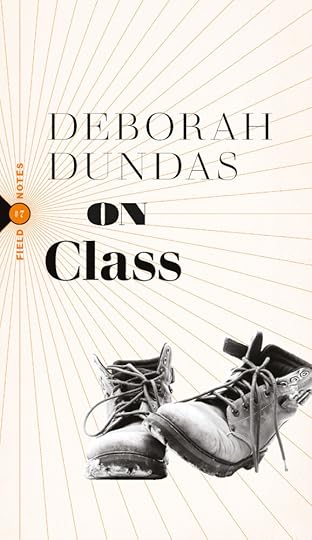 On Class
by Deborah DundasBiblioasis, 2023
On Class
by Deborah DundasBiblioasis, 2023Deborah Dundas is a journalist who grew up poor and almost didn’t make it to university. In On Class , she talks to writers, activists, those who work with the poor and those who are poor about what happens when we don’t talk about poverty or class—and what will happen when we do.
Growing up poor, Deborah Dundas knew what it meant to want, to be hungry, and to long for social and economic dignity; she understood the crushing weight of having nothing much expected of you. But even after overcoming many of the usual barriers faced by lower- and working-class people, she still felt anxious about her place, and even in relatively safe spaces reluctant to broach the subject of class. While new social movements have generated open conversation about gender and racism, discussions of class rarely include the voices of those most deeply affected: the working class and poor.
On Class is an exploration of the ways in which we talk about class: of who tells the stories, and who doesn’t, which ones tend to be repeated most often, and why this has to change. It asks the question: What don’t we talk about when we don’t talk about class? And what might happen if, finally, we did?
Praise for On Class
“I really enjoyed Deborah Dundas’s small and brave book On Class. She addresses the need to speak about the different classes in Canada, and the ways it is almost impossible to cross their divides.”
—Heather O’Neill, author of When We Lost Our Heads
“On Class is urgent and wise, written with Dundas’ trademark wit and crisp prose. Raw and smart, it urges readers not to look away from the complexity of issues affecting the poor and working class, especially in a time of constant political, economic, and social turmoil.”
—Open Book
“On Class is a great read, perfect for readers less familiar with the notion of class and what it really means, but also interesting and thoughtful enough for those who have already begun to engage with the topic. Dundas pulls a lot of threads together in this volume, but it works really well and serves as an excellent, broad starting point.”
—The Miramichi Reader
The Canadian Press, “Home Ownership a Priority to Millennials: Poll,” Global News, March 25, 2016.
2Chris Fox, “More than 40 Per Cent of Young Homeowners in Ontario Got Financial Help from Parents: Poll,” CTv News, February 22, 2022.
3Gary Mason, “The Great Generational Wealth Transfer Is Under Way,” Globe and Mail, March 12, 2021.
4Keith Costello, “The ‘Great’ Wealth Transfer: An Opportunity or Threat?” Investment Executive, October 11, 2016.
Support Send My Love to AnyoneThis newsletter is free, but you can support it by signing up for a monthly or yearly subscription, liking this post, or sharing it!
Big heartfelt thanks to all of the subscribers and contributors who make this project possible!
ConnectTwitter | Instagram | @themockler | Archive | Contributors | Subscribe
May 20, 2023
Concetta Principe | Issue 27
My failure does not start in the third year of my undergrad, first year at U of T, in my second year class on Chaucer. But I will start there since it’s relevant to my degree, my suffering (we all suffer), and the reason my application to the PhD program in English Literature at York University was rejected. It was a shock, rejection always is. I begged The Chair for an explanation. He was a medievalist, someone whose scholarship was on Arthurian Legend, who had probably aced Chaucer, so he was embarrassed for me when he explained my D in Chaucer “didn’t impress the committee.” That impression, in fact, led them to reject my application.
My doctoral degree started with a medieval failure.
My Chaucerian prof at U of T was affiliated with High Anglican Trinity College, the oldest and most prestigious college at the university. She was so High Anglican that she talked that way: chin lifted, trans-continental. Yes, she spoke the imperialist accent. I don’t think she used regular toilet paper. I don’t know if anyone liked her — she was old and of a different order. None of us were equal to her. Her bones were brittle, which is why she loped in with a cane and a broken hip on that first day of class. She was gracious after all: goodness, she had so much grace, much in the way a New England snob does. Almost a masonic, closed and very suspicious of foreigners. I was suspicious, in name and colour. I was the dago born of working class jeans, destined to be a salesclerk at Cotton Ginny.
Apparently, Chaucer said “K-nigh-t” as the Germans did. She loved to say it, all its consonants sticking as they rolled along her teeth and tongue.
I had also read Joyce’s Ulysses that third year of my undergrad, thanking god I’d read Homer’s Odyssey, and loving Joyce’s Penelope. For the first time, I read Sir Gawain and the Green Knight. K-nigh-t. A tale I would reread too many times to count.
The volatility of my personal relationship at the time, the anxiety of being abandoned, the anxiety of not knowing the future, the terror that I was destined to fail…
I failed my first assignment on Chaucer. In fact, the professor said that day she returned the essays, “if you have failed this assignment, I advise you to quit, now, while you’re ahead.” I couldn’t. Why? Because I only give up if I’m thrown off the boat. I didn’t drop out and was refused boarding to the doctorial ship because of my D, or disease. Or was it D+? A matter of a degree.
With the Disavowal of a King who is about to lose his kingdom, I turned from the ‘letter’ that said ‘no’ to my PhD application in English, and applied for an MA in the Humanities Program where I was accepted. I saw no significant difference between English Lit and Humanities. And unknowingly, I had become affiliated with all the MA MA’s in the world: the double Master.
WHY? — A WORKING THESIS QUESTIONWhy would I walk straight into failure? Why wasn’t I smart enough to accept NO and walk away? That’s right. Why would I do something that was going to hurt me? Why wouldn’t I listen to my body? Why wouldn’t I heed my disordered thoughts? Why do any of us do things that hurt us?
Order Discipline N. V. from Palimpsest Press
Concetta Principe is an award winning poet and a scholar. Discipline N. V. just came out with Palimpsest Press (2023). Her next project is a book of poetry with Gordon Hill Press, titled Disorder (2024). Her first poetry collection, Interference, won the Bressani Award for poetry in 2000. She teaches at Trent University.
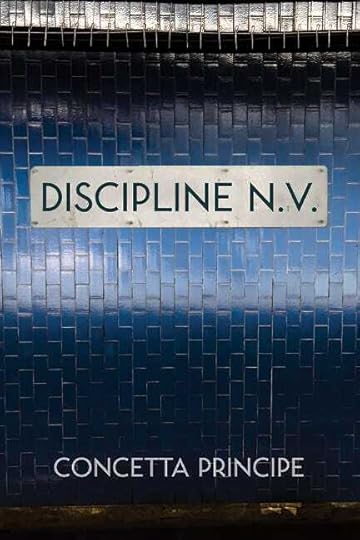 DISCIPLINE n. v.
by Concetta PrincipePalimpsest Press, 2023
DISCIPLINE n. v.
by Concetta PrincipePalimpsest Press, 2023Discipline n. v. is a lyric memoir that fuses poetry and academic theory, speaking to the metaphorical power of humanities scholarship. Throughout, Concetta Principe articulates the ‘discipline’ involved in earning a PhD while dealing with a mood disorder, opening up about prejudices that serve as barriers to academic success, the apotheosis being tenure. Embracing the Nachträglichkeit of the traumatic experience of being an old(er) female PhD candidate, Discipline n. v. is ultimately a story of lack and its transformative powers: the student becomes an academic as colonial humanities struggles through its extinction.
Praise for Discipline, n. v.Discipline, n. v. is a gripping, ironic, groundbreaking expose of a woman's quest to be perceptually alive & embodied in the academy.
- Betsy Warland
In Discipline n. v., Concetta Principe (or her author effects, Betty or Lacan or Tiresias) whittles away at keywords for what and who is struck out (on strike) between disciplines of the neoliberal university, and spells out an intimate reminiscence of the university as its violent dehiscence – not least its dissimulation of inclusion, equity and diversity as a commodity form of our own. Chronicling what is indefensible, Principe makes of lyric a lingering space of insight keening, frustrated hunger and dogged refusal.
- Trish Salah
Support Send My Love to AnyoneThis newsletter is free, but you can support it by signing up for a monthly or yearly subscription, liking this post, or sharing it!
Big heartfelt thanks to all of the subscribers and contributors who make this project possible!
ConnectTwitter | Instagram | @themockler | Archive | Contributors | Subscribe
May 17, 2023
Catherine Graham | Issue 27
Catherine Graham, an award-winning poet and novelist, lives in Toronto. Her nine books include Æther: An Out-of-Body Lyric, a finalist for the Trillium Book Award, Toronto Book Award and winner of the Fred Kerner Book Award. Published internationally, she co-hosts The Hummingbird Podcast, part of the WNED PBS Amplify app, and teaches creative writing at the University of Toronto School of Continuing Studies where she won an Excellence in Teaching Award. Author of The Most Cunning Heart and the award-winning novel Quarry, she has been a finalist for the Sarton Book Award and the Montreal International Poetry Prize, and has won the Miramichi Reader Award for Best Fiction and an IPPY Gold Medal for Fiction. A previous winner of Toronto International Festival of Authors’ Poetry NOW, she leads their monthly book club, interviews for By the Lake Book Club and is a judge for the 2023 CBC Poetry Prize. Put Flowers Around Us and Pretend We’re Dead: New and Selected Poems is her latest book. www.catherinegraham.com
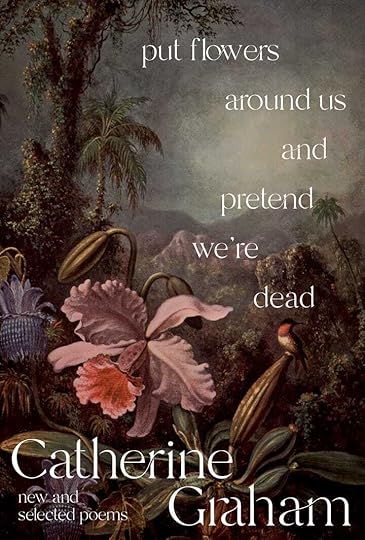 Put Flowers Around Us and Pretend We’re Dead: New and Selected Poems
Catherine GrahamWolsak and Wynn, Buckrider Books, 2023
Put Flowers Around Us and Pretend We’re Dead: New and Selected Poems
Catherine GrahamWolsak and Wynn, Buckrider Books, 2023Put Flowers Around Us and Pretend We’re Dead is a beautiful collection of Catherine Graham’s award-winning poetry. Spanning twenty years of writing these poems trace Graham’s arc from ARC Poetry Magazine’s initial observation that “Graham is a young poet whose work should be closely attended to” to the Toronto Star writing “Catherine Graham’s seventh book of poetry is an intricate reverie.” Poems within this collection circle around profound themes, including family, healing, loss and love, but they are written with a delight in the natural world, a delicate line and ethereal imagery. Here, birds are gathered in bouquets, a ghost is a fold in the mind and the snow holds light. Put Flowers Around Us and Pretend We’re Dead is a must-have volume from a much-loved poet.
Order from Wolsak and Wynn.
Support Send My Love to AnyoneThis newsletter is free, but you can support it by signing up for a monthly or yearly subscription, liking this post, or sharing it!
Big heartfelt thanks to all of the subscribers and contributors who make this project possible!
ConnectTwitter | Instagram | @themockler | Archive | Contributors | Subscribe
May 16, 2023
Gatherings | Issue 27
 Where Do I Start? | Writing Prompts by Kathryn MocklerTime TravelerTime Traveler is one of my favourite writing exercises. It can be used for all genres of writing and can generate some unusual results. I’ve used this exercise in experimental writing, poetry, and fiction workshops. Thanks for reading Where Do I Start? | Writing Prompts by Kathryn Mockler! Subscribe for free to receive…Read more2 minutes ago · Kathryn MocklerRecommended Viewing
Where Do I Start? | Writing Prompts by Kathryn MocklerTime TravelerTime Traveler is one of my favourite writing exercises. It can be used for all genres of writing and can generate some unusual results. I’ve used this exercise in experimental writing, poetry, and fiction workshops. Thanks for reading Where Do I Start? | Writing Prompts by Kathryn Mockler! Subscribe for free to receive…Read more2 minutes ago · Kathryn MocklerRecommended ViewingI enjoyed the Being Mary Tyler Moore documentary. I forgot she was the first woman to wear pants on TV in the Dick Van Dyke Show.
I also enjoyed BEEF and the second season of Somebody Somewhere, which has been renewed for a third season! Yay! And of course I watch Succession.
I also saw a terrible movie on Criterion called Bedroom Window (1987). It’s kind of a good-bad movie but mostly bad.
Sari Botton on being childfree:
We are Childfree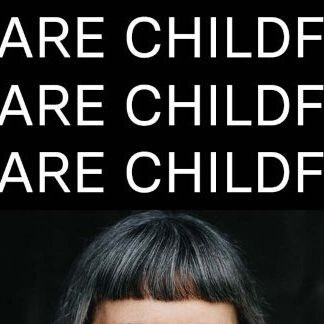 We are Childfree on Instagram: “So excited to welcome a Gen X icon to the pod! Author Sari Botton never felt entitled to choose not to be a mother, and at 40, found herself in a fertility clinic getting a diagnosis that gave her “permission” to live a happily childfree life: “Being of the generation that I’m from - I’m the oldest Gen X you can be - nobody told me I was allowed to just opt out. And I needed the intervention of biology, and medicine, to tell me, you actually can’t do this. And when I found out I needed a hysterectomy, my shoulders descended. Everything felt much less stressful. And I just thought, I don’t have to do this. And it was a relief. It was a great relief.” Listen to the We are Childfree podcast wherever you get pods! 🎙 Link in bio 👆 #wearechildfree #childfreepodcast #childfree #childfreebycircumstance #childfreelife #childfreelifestyle #childfreewomen #childfreecommunity #childfreestory #genX”May 26, 2023Recommended Reading
We are Childfree on Instagram: “So excited to welcome a Gen X icon to the pod! Author Sari Botton never felt entitled to choose not to be a mother, and at 40, found herself in a fertility clinic getting a diagnosis that gave her “permission” to live a happily childfree life: “Being of the generation that I’m from - I’m the oldest Gen X you can be - nobody told me I was allowed to just opt out. And I needed the intervention of biology, and medicine, to tell me, you actually can’t do this. And when I found out I needed a hysterectomy, my shoulders descended. Everything felt much less stressful. And I just thought, I don’t have to do this. And it was a relief. It was a great relief.” Listen to the We are Childfree podcast wherever you get pods! 🎙 Link in bio 👆 #wearechildfree #childfreepodcast #childfree #childfreebycircumstance #childfreelife #childfreelifestyle #childfreewomen #childfreecommunity #childfreestory #genX”May 26, 2023Recommended ReadingI’m currently reading Tuesday or September or The End by Hannah Black. This was on many year end reading lists in December. I had a hard time finding a copy but got one this week, and so far I’m loving it. It’s an alien invasion book set in 2020.
I just finished The Double Life of Benson Yu by Kevin Chong, a dark and complex metafictional novel. Highly recommend.
If you are looking for excellent writing about books and reading check out Steven Beattie’s blog That Shakespearean Rag. I particularly like this 31 Days of Short Stories.
CBC put together a list of 24 books by past CBC Poetry Prize winners and finalists being published in 2023 and included my forthcoming story collection Anecdotes!
Recommended ResidencyBanff Winter Writers Residency 2024 with Casey Plett and Waubgeshig RiceThe Winter Writers Residency is a self-directed program that offers time and space for writers to retreat, reconnect, and re-energize their writing practice. In addition to a single room, and a small private studio, you will be surrounded by a community of artistic peers with the opportunity to attend inspiring talks, performances, and meet with guest faculty to consult on your work.
Application Deadline: September 24, 2023
Upcoming Contributor Events Fertile Festival 2023 - August 11-20, 2023 - knife | fork | book
Fertile Festival 2023 - August 11-20, 2023 - knife | fork | book
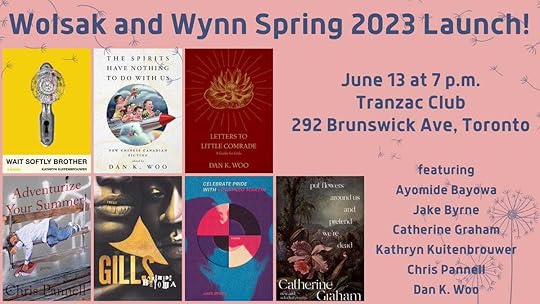 Wolsak and Wynn Spring Launch - June 13, 2023!
Wolsak and Wynn Spring Launch - June 13, 2023!7:00 PM 9:00 PM - Tranzac Club292 Brunswick Avenue, Toronto, ON
FEATURING:
Wait Softly Brother by Kathryn Kuitenbrouwer
The Spirits Have Nothing to Do with Us: New Chinese Canadian Fiction edited by Dan K. Woo
Letters to Little Comrade by Dan K. Woo
Adventurize Your Summer! by Chris Pannell
Gills by Ayomide Bayowa
Celebrate Pride with Lockheed Martin by Jake Byrne
Put Flowers Around Us and Pretend We’re Dead: New and Selected Poems by Catherine Graham.
 Book Launch for On Class by Deborah Dundas
Book Launch for On Class by Deborah Dundas
Join author and Toronto Star editor Deborah Dundas for the launch of On Class, the latest title in Biblioasis' Field Notes series. Reading and discussion with open Q&A, and book signing to follow.
June 15, 2023
Flying Books, 784 College Street, Toronto - 6:30pm
Free event. Books for sale.
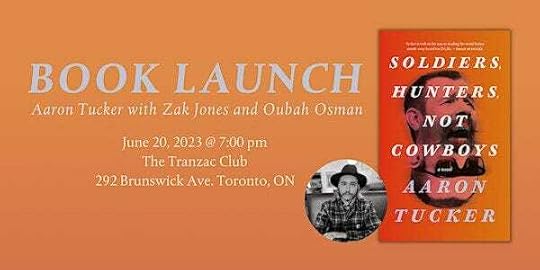 Book launch for Aaron Tucker’s novel
Soldiers, Hunters, Not Cowboys
Book launch for Aaron Tucker’s novel
Soldiers, Hunters, Not Cowboys
Tue, Jun 20, 2023 7:00 PM - 10:00 PM EDT
Tranzac Club 292 Brunswick Avenue Toronto, ON M5S 2M7
Recommended Substacks Sitting in Silence Mystery of the First Page“He who fears is literally delivered to destruction.” – Howard Thurman Hello and Welcome to Sitting in Silence. I’m your stalwart guide to writing, craft, worry, and joy. Let’s talk about worry and craft. But first… Ever been to Maine? I have. It’s quite beautiful. And it’s even more beautiful because I’m teaching a class for you called…Read more10 days ago · 18 likes · 4 comments · Sitting in Silence
Sitting in Silence Mystery of the First Page“He who fears is literally delivered to destruction.” – Howard Thurman Hello and Welcome to Sitting in Silence. I’m your stalwart guide to writing, craft, worry, and joy. Let’s talk about worry and craft. But first… Ever been to Maine? I have. It’s quite beautiful. And it’s even more beautiful because I’m teaching a class for you called…Read more10 days ago · 18 likes · 4 comments · Sitting in Silence Before and After the Book DealShould you start a Substack? 5 tips before you launchFirst things first. This newsletter marks my one-year anniversary on Substack! I’ve been having such a good and meaningful time here, and I’m endlessly grateful for your enthusiasm and support around my efforts to make writing and publishing more fun and less opaque. I have big plans for the year ahead and I hope you’ll stay a part of those big plans…Read more2 days ago · 49 likes · 58 comments · Courtney Maum
Before and After the Book DealShould you start a Substack? 5 tips before you launchFirst things first. This newsletter marks my one-year anniversary on Substack! I’ve been having such a good and meaningful time here, and I’m endlessly grateful for your enthusiasm and support around my efforts to make writing and publishing more fun and less opaque. I have big plans for the year ahead and I hope you’ll stay a part of those big plans…Read more2 days ago · 49 likes · 58 comments · Courtney Maum Memoir LandThirteen Excellent Essays to Read on this Holiday from Work...Welcome to Memoir Land—a newsletter now featuring three verticals: Memoir Monday, a weekly curation of the best personal essays from around the web brought to you by Narratively, The Rumpus, Granta, Guernica, Oldster Magazine, Literary Hub, Orion Magazine…Read more4 days ago · Memoir LandSupport Send My Love to Anyone
Memoir LandThirteen Excellent Essays to Read on this Holiday from Work...Welcome to Memoir Land—a newsletter now featuring three verticals: Memoir Monday, a weekly curation of the best personal essays from around the web brought to you by Narratively, The Rumpus, Granta, Guernica, Oldster Magazine, Literary Hub, Orion Magazine…Read more4 days ago · Memoir LandSupport Send My Love to AnyoneThis newsletter is free, but you can support it by signing up for a monthly or yearly subscription, liking this post, or sharing it!
Big heartfelt thanks to all of the subscribers and contributors who make this project possible!
ConnectTwitter | Instagram | @themockler | Archive | Contributors | Subscribe
April 30, 2023
Send My Love to Anyone | Issue 26
Send My Love to Anyone is a reader-supported publication. To receive new posts and support this project, consider becoming a free or paid subscriber.
Hello Friends,
Send My Love to Anyone is a top publication on the Substack Leaderboard! How cool is that?
Welcome to all the new subscribers!
For those new to this newsletter, Send My Love to Anyone is a monthly literary newsletter where I write about writing and sometimes other things, and I invite guests to write on a range of topics. Check out past guest contributors. Also check out Kirby’s (author of Poetry is Queer) SMLTA column The First Time.
For Issue 26, comic artist and graphic novelist, Diana Tamblyn, shares the process of adapting Cornelia Hoogland’s poetry book Woods Wolf Girl into a comic book. I write about shame, grant announcements, and toxic writing friendships and embarrassing myself in public … again.
For Issue 26 Gatherings (a roundup of recommendations), SMLTA recommends an essay by Alicia Elliot, a video by Sacha Archer, Rabbits by David Lynch, The Shit No One Tells You About Writing, The Festival of Literary Diversity, Another Story Bookshop’s May Readings & more!
Although I’ve been a lurker for years, I’ve started using TikTok, and I’m going down the rabbit hole of BookTok and WriterTok. It’s been interesting and fun. I’ll be writing about for a forthcoming issue.
I’m trying to find other writers and readers on TikTok. If you’re on TikTok, share your link in the comments.
Hope you enjoy this issue!
Kathryn
Issue #26 of Send My Love to AnyoneA Girl Walks Into the Woods by Diana Tamblyn
On Shame, Grant Announcements, and Toxic Writing Friendships by Kathryn Mockler
Embarrassing Myself in Public by Kathryn Mockler
Sign up for Where Do I Start? | Writing Prompts & Resources by Kathryn Mockler
Support Send My Love to AnyoneThis newsletter is free, but you can support it by signing up for a monthly or yearly subscription, liking this post, or sharing it!
Big heartfelt thanks to all of the subscribers and contributors who make this project possible!
ConnectTwitter | Instagram | @themockler | Archive | Contributors | Subscribe
Diana Tamblyn | Issue 26
A Girl Walks Into the Woods is a self-published comic book adapted by cartoonist Diana Tamblyn from the poetry book Woods Wolf Girl by Cornelia Hoogland (Wolsak & Wynn, 2011).
The comic made its debut at the Toronto Comic Arts Festival in June of 2022. The story is a modern retelling of the fairy tale “Little Red Riding Hood”.
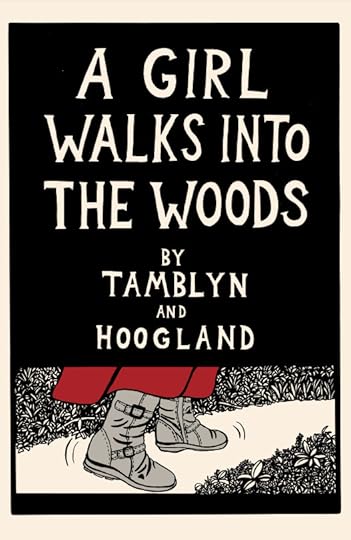 Cover to the comic “A Girl Walks Into the Woods”.The Genesis of the Comic
Cover to the comic “A Girl Walks Into the Woods”.The Genesis of the ComicI am not a poetry connoisseur by any means, but I did pick up and read Woods Wolf Girl by Cornelia Hoogland a few years ago, and it completely blew me away. It was so visceral and visual, a powerful interpretation of one of the most popular fairy tales.
Since many are familiar with “Little Red Riding Hood’s” main plot points and visual iconography (red cape, wolf, woods, girl) both Cornelia and I had an incredible amount of artistic freedom to reimagine aspects of the story that are not usually explored.
For instance, in Woods Wolf Girl, Cornelia focused on the relationship between the three female protagonists in the story – Red, her Mother, and her Grandmother. This really appealed to me and was something I wanted to include in my adaptation. I had no interest in the Woodsman as a character or hero. To me Red is the hero of the story.
In addition to centering the female characters from the fairytale, Cornelia disrupts the chronology and setting. At one point the setting is timeless where the time and place could be anywhere from 1950s to present day and then we jump to a shoot on a modern-day film set in Algonquin Park. Cornelia also morphs the wolf into different characters such as a teenage boy playing records for a girl in his bedroom to a businessman trying to ask a young woman out.
 Who is the wolf in Little Red Riding Hood?Creating the Comic
Who is the wolf in Little Red Riding Hood?Creating the ComicAfter reading, Woods Wolf Girl, I visualized many of the scenes in my head immediately and wanted to draw them. I contacted Cornelia and asked if I could adapt the book as a comic. She was enthused and gave me carte blanche to tackle the project however I saw fit. This almost made my job harder because I had no parameters or constraints to work with.
I started by reading through the book multiple times and marking which poems I wanted to adapt. Many of the poems worked perfectly on their own, and if I felt I couldn’t add anything to them graphically, then I chose not to include them.
Once I made my selections, I thumb-nailed the poems, which is the process of breaking down the story panel by panel. This determines the flow, the imagery, and the pacing. With thumbnails you can tell pretty quickly if a page is working or not. Cartooning is a slow and laborious affair, so you really don’t want to spend hours or days on a page only to realize that you have to chuck it.
I struggled for months on how to depict the wolf. I considered alluding to him off panel or portraying him in shadows. To me, the scariest villains/threats are ones you can’t see and that your mind conjures.
Although I wanted the readers to create their own image of the wolf, Red meeting the Wolf in the woods is one of the main storylines in the comic, and I just couldn’t figure out how to do it without showing him. In the end, I chose to portray him as a cool wolf who wears a business suit and smokes in the forest, and I’m pleased with how he came out.
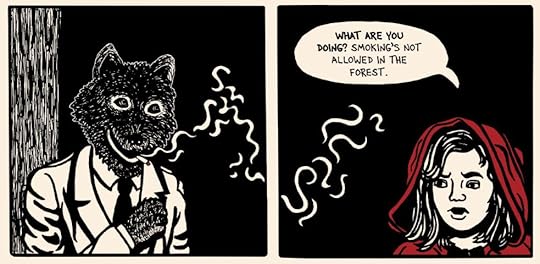 The wolf meets Red in the woods.
The wolf meets Red in the woods.Throughout the process, I shared thumbnails and fully inked pages with Cornelia for her input and feedback. I rarely changed any of the text of the poems; however, if a text needed to be changed to fit the visual, Cornelia updated the text. She was also an invaluable first reader, highlighting anything that wasn’t clear. On the few occasions where we disagreed on a page, we were able to work through a solution that satisfied both of us and improved the comic overall.
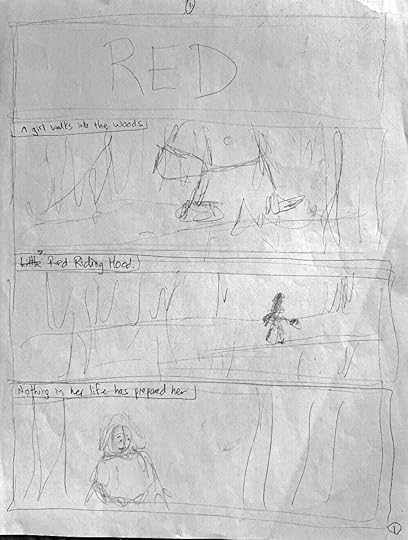 Rough thumbnail of three panels
Rough thumbnail of three panels
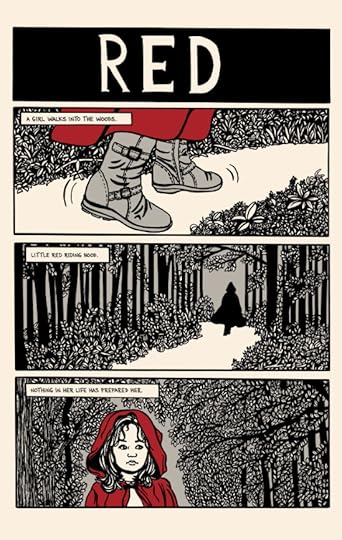 Finished comic page
Finished comic pageAfter settling on the pacing and breakdowns of the pages, I began searching for visual references. I chose to depict Red in motorcycle boots because I wanted to show right off the bat – from the cover and the very first panel above, that this is not your typical version of “Little Red Riding Hood”. I also wanted it to be clear that the forest is a character in the story, a living, organic thing.
I work traditionally with pencil on Bristol, then use ink with brushes and technical pens. The pages are scanned into the computer where I apply grey tones and colour. It’s a laborious process. Because I have a day job, a teenager, my husband, two animals, and I am slow at drawing, the creation of the book took a few years. For long periods of time, I would be working away drawing and Cornelia would hear nothing from me. Then I would send her an email (I’m sure for her seemingly out of nowhere), with pages to look at.
One of the best ways to move a project forward is to have a tangible deadline, so I applied to the Toronto Comic Arts Festival (TCAF) to give myself one. When I found out I got accepted in the spring of 2022, things started to move at a breakneck pace. The comic now HAD to be completed by a certain date.
Production and Launch
I am a member of a group of cartoonists in London, Ontario called “Comic Time,” we get together and talk comics and egg each other on to draw and work on projects together. Just as I was finishing up the drawing for this comic, one of my friends from the group – Jacqueline Demendeev (a talented artist in their own right), asked me if I needed any help with it. One of the smartest things I did was to say – yes!
The actual production and printing of a comic requires its own set of skills. Jacqueline and I agonized about paper quality, paper colour (a creamy off-white to give a warm, old-timey feel as opposed to a stark white), and what colour red worked the best. Jacquline arranged for samples on different paper stocks, and we compared them. Once a proof was ready, Cornelia, Jacqueline, and I met on a Zoom call and examined each page one by one.
This was one of the best experiences of the whole project – the three of us putting our heads together and talking through the pages. Cornelia would suggest line breaks in some panels and pages for a better visual rhythm. There were instances where the action was confusing, or we all weren’t on board with the wording. Sometimes Cornelia wrote captions on the spot. It was a fun meeting of the minds.
A Girl Walks in the Woods has been out in the world for about six months now and has had a fantastic reception. The first print run is almost sold out, and Cornelia and I were featured speakers at WordsFest in London, Ontario on November 19, 2022. Jacqueline moderated the discussion which brought this project full circle.
We’ll be in a few other events this year, and then it’s back to the drawing board for my next project, which is creating artwork for a new drawing app called “DrawnTogether,” produced by Pop Sandbox.
DrawnTogether will be launched in the spring of 2023 and is inspired by the Exquisite Corpse drawing game, where artists start with a folded piece of paper and take turns drawing a head, torso, or feet, not knowing or seeing what the other person has drawn. In the end, you unfold the pages to see the final results of the collaboration. The DrawnTogether app is a fun take on this, where people can download the game and use the built-in drawing tools to create an artwork themselves or collaborate with others. Pop Sandbox has commissioned a number of artists to produce artwork for DrawnTogether to inspire to its users.
Diana Tamblyn is an award-winning artist and graphic novelist who has been actively writing and drawing comics for over 20 years. She’s exhibited her comics at small press fairs and comic book festivals in both Canada and the US and has had artwork displayed in various group and solo shows. In 2005, She was chosen by the Globe and Mail as a “Canadian cartoonist to watch”. She is the recipient of a Canada Council Grant, a London Arts Council Grant, is the founder of the “Ting Comic and Graphic Arts Festival” in London, Ontario, has served on the Ontario Arts Council Jury and recently curated the show “Words and Pictures: Cartoonists from Southwest Ontario” for Museum London. Diana graduated from Concordia University in Montreal with a BFA in Film Animation.
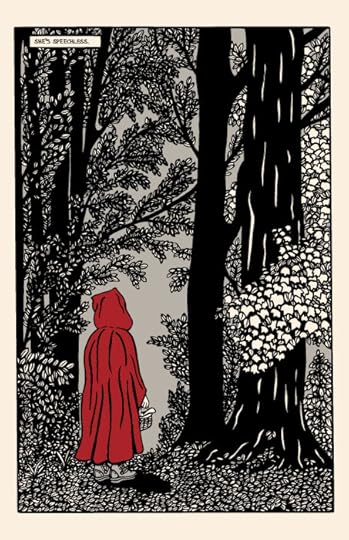
A comic adaptation of poet Cornelia Hoogland's book "Woods Wolf Girl". Little Red Riding Hood like you've never encountered her before. A contemporary re-telling of the age old fairy tale.
Purchase a copy of A Girl Walks Into the Woods
Support Send My Love to AnyoneThis newsletter is free, but you can support it by signing up for a monthly or yearly subscription, liking this post, or sharing it!
Big heartfelt thanks to all of the subscribers and contributors who make this project possible!
ConnectTwitter | Instagram | @themockler | Archive | Contributors | Subscribe
April 17, 2023
My Pre-writing Freeze | Words Count
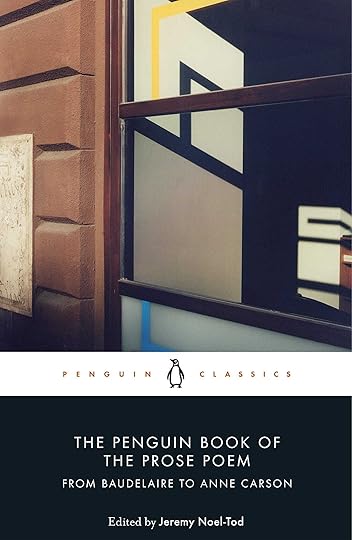
A couple of months ago I was invited to write a short fiction piece for an online journal. I happy agreed because I loved the project.
But when I sat down to work on something for it, I was gripped by my familiar and what I now call my pre-writing freeze. I wouldn’t call it writer’s block—although perhaps that’s what this is. It doesn’t quite feel as serious as writer’s block, but it certainly is annoying!
I just finished writing a book of short stories! I know logically that I can write something, but this always happens when I’m expected to write something.
My fix for this state is to recognize it and not freak out, and then do what I always do—read something that will get me excited about writing!
Last night I chose to read the Penguin Book of Prose Poetry (2019) which was just about the most perfect thing to read with its juxtaposition of voices and styles. Some prose poems were more prosaic, others more lyrical. Some of my favourite pieces include “Blue Dog” Luke Kennard, “Conversation About Home (at the Deportation Centre” by Warsen Shire, “Rape Joke” by Patricia Lockwood,” and excerpt from Citizen: An American Lyric by Claudia Rankine, an excerpt from The Weather by Lisa Robertson.
Anyway it’s a great anthology!
And, yes, I did get my story written too!
Kathryn Mockler’s debut story collections Anecdotes is forthcoming from Book*hug. Pre-order Anecdotes at your local bookstore.
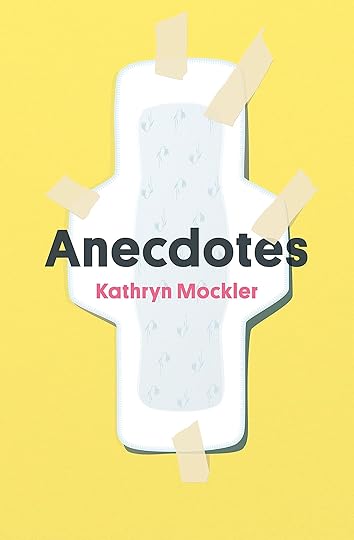 Support Send My Love to Anyone
Support Send My Love to AnyoneThis newsletter is free, but you can support it by signing up for a monthly or yearly subscription, liking this post, or sharing it!
Big heartfelt thanks to all of the subscribers and contributors who make this project possible!
ConnectTwitter | Instagram | @themockler | Archive | Contributors | Subscribe
April 12, 2023
An Itch
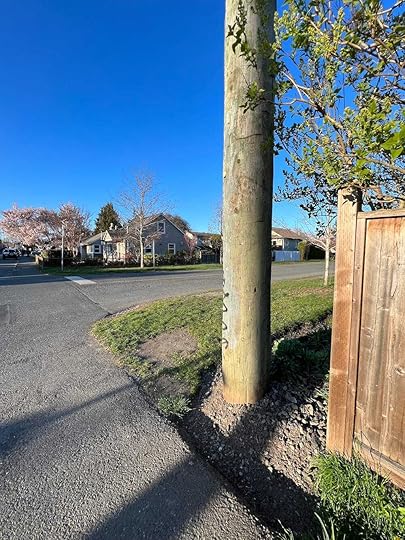
Will I ever stop embarrassing myself in public?
Probably not.
It’s spring in Victoria, the kind of weather where it’s not quite warm enough to give up a spring jacket entirely.
I’m walking to the university, which is about a 50-minute walk from my apartment. Fifteen minutes into the walk, my back gets sweaty under my jacket and heavy backpack.
An itch starts to form in the middle of my back where I absolutely cannot reach it with my coat on and likely would not be able to reach it with my coat off either.
I look around for somewhere to attend to the itch, which is increasing in severity with every second.
I spot a telephone pole and stand near it waiting while several cars pass so they won’t see me. When I think the coast is clear, I drop my backpack and lean my back on the pole and proceed to relieve the itch which is now actually painful in it’s intensity.
Closing my eyes, I continue to rub my back on the pole. As the itch dissipates, I moan in relief. There is nothing quite so pleasurable as relieving oneself of an uncomfortable itch.
Then I hear the jingle of a dog leash. I open my eyes and a few feet to my right a man and his dog are staring at me.
“I have an itchy back,” I say peeling myself off the pole.
“Yes, and you have many layers on,” he says helping me normalize my behavior.
“I was hoping no one would see me.”
He laughs kindly, and we go our separate ways.
Support Send My Love to AnyoneThis newsletter is free, but you can support it by signing up for a monthly or yearly subscription, liking this post, or sharing it!
Big heartfelt thanks to all of the subscribers and contributors who make this project possible!
ConnectTwitter | Instagram | @themockler | Archive | Contributors | Subscribe
April 2, 2023
On Shame, Grant Announcements, and Toxic Writing Friendships | Issue 26
I recently learned something about myself, and I’ve had one-eighty on a long held opinion.
During grant results season many people share whether they got grants, didn’t get grants, and their opinion on grant announcements.
For years, I held firm to the notion that grant announcements on social media were bad—even though I have engaged in every form of self-promotion out there, and I encourage and coach writers I work with to self-promote and use social media. And as publisher, I even get a little irritated when people don’t.
So why did I draw the line at grant announcements? I used to maintain that it was insensitive to writers in your feed who didn’t get grants that round.
But that same logic could be applied to any form of self-promotion or any kind of positive news. So if someone got rejected from a literary magazine or a publisher where you were accepted, should you avoid sharing your story to spare the feelings of all the people who didn’t get an acceptance?
No, of course not. That’s ridiculous, so why did I feel that way about grant announcements?
I was not opposed to grant announcements out of any sense of jealousy. I’ve received grants throughout my career and some have saved me during bleak financial times, but I’ve also had my share of rejections. I am neither jealous, nor resentful when someone else gets a grant, so why was I so strongly opposed to people sharing this on social media?
A few weeks ago, I wrote a tweet about grant announcements and how I thought it was insensitive to share grant news on social media, but something about my tweet didn’t sit right with me. I didn’t like my own take, but I wasn’t sure why. The tone was off. It felt like I shaming others, so I deleted it. But I was curious about my own response and kept thinking about it.
The next day, I saw other tweets about grant announcements on my feed. One by Alicia Elliot, stopped me in my tracks.
 Alicia Elliott @WordsandGuitarMaybe unpopular opinion, but I think it's great when writers post about grants they're awarded. Writing is often gruelling & solitary. We should celebrate our successes when and where we can. If seeing another writer succeed makes you angry/jealous, deal with it. You're an adult.4:41 PM ∙ Feb 24, 2023280Likes9Retweets
Alicia Elliott @WordsandGuitarMaybe unpopular opinion, but I think it's great when writers post about grants they're awarded. Writing is often gruelling & solitary. We should celebrate our successes when and where we can. If seeing another writer succeed makes you angry/jealous, deal with it. You're an adult.4:41 PM ∙ Feb 24, 2023280Likes9Retweets Alicia Elliott @WordsandGuitarChannel your emotions into making your work better, rant to your besties in a group chat, talk to a therapist if it gets real bad. But don't try to shame others into hiding their success and joy because you think it should have been yours. Bitterness is always obvious and ugly.4:45 PM ∙ Feb 24, 202348Likes1Retweet
Alicia Elliott @WordsandGuitarChannel your emotions into making your work better, rant to your besties in a group chat, talk to a therapist if it gets real bad. But don't try to shame others into hiding their success and joy because you think it should have been yours. Bitterness is always obvious and ugly.4:45 PM ∙ Feb 24, 202348Likes1RetweetAs did Jenny Heijun Wills’ response to it.
 jenny heijun wills @JennyHeijunPunitive (or even just mean) envy makes this job even more solitary and discouraging. (Full disclosure, i don’t apply for arts grants so my opinion is just impressionistic), but you are wise as always, Alicia https://t.co/ui08VmrFEn
jenny heijun wills @JennyHeijunPunitive (or even just mean) envy makes this job even more solitary and discouraging. (Full disclosure, i don’t apply for arts grants so my opinion is just impressionistic), but you are wise as always, Alicia https://t.co/ui08VmrFEn Alicia Elliott @WordsandGuitarMaybe unpopular opinion, but I think it's great when writers post about grants they're awarded. Writing is often gruelling & solitary. We should celebrate our successes when and where we can. If seeing another writer succeed makes you angry/jealous, deal with it. You're an adult.12:41 AM ∙ Feb 25, 2023
Alicia Elliott @WordsandGuitarMaybe unpopular opinion, but I think it's great when writers post about grants they're awarded. Writing is often gruelling & solitary. We should celebrate our successes when and where we can. If seeing another writer succeed makes you angry/jealous, deal with it. You're an adult.12:41 AM ∙ Feb 25, 2023As someone who prides themselves on being community-minded and supportive of other writers, why was I being such a jerk about this particular issue?
There is no feeling greater as a writer than to get your first arts grant.
And then it suddenly hit me why I had I been opposed to grant announcements, which actually has very little to do with grant announcements, and everything to do with a toxic writing friendship in my early writing days.
When I had just finished grad school, a friend of mine got a grant from the Ontario Arts Council for $12 000. As you can imagine, this was a significant amount of money in 1998.
When my friend told me, I was thrilled for them, and they wanted to celebrate by treating ME to lunch! How sweet!
Over lunch, I asked them all about their grant experience, and they were positively beaming. There is no feeling greater as a writer than to get your first arts grant, and a big grant at that! My friend showed me their award letter and told me how they wrote the grant. They even offered to share with me their application and encouraged me to apply for the next round.
That was a great day. I was fully celebrating my friend and learned something new.
I vowed that if I ever got a grant, I would do the same thing for someone else—take them out for lunch and pass on what I learned about grant writing.
Lo and behold my friend’s grant writing tips were spot on, and the following year I got the same grant!
I was over the moon.
At the time I had a couple of publications but was not very confident in my writing. In addition, I was in a pretty precarious financial situation and wasn’t sure how I was going to make a living after grad school while also having to pay back heavy student loans.
In keeping with this new tradition I was excited to uphold, I called another writer friend who I admired to share my news and invite them out for lunch.
But their reaction was not what I expected.
There was a pause and an icy tone on the other end of the line. No curious questions were asked, and the call ended quickly with an obligatory but cool: “Congrats.” This writer and I did not write in the same genre nor had they even applied for this award.
I was stunned, and I felt deep shame for sharing my good news. We didn’t even get to the lunch part because the conversation ended so abruptly. It was clear that I was not going to be celebrating with this person. Although I had the good sense to back away from this brief but impactful friendship, this experience shaped how I behaved going forward. Instead of realizing that this was their problem and not mine, I became exceedingly careful about sharing good news with anyone except my family.
Years later as social media took hold and announcing writing accomplishments and self-promotion became part of the writing and publishing landscape, I joined in reluctantly at first. But once I began publishing the work of others, I realized the necessity of self-promotion.
Despite my embrace of self-promotion, I never ever announced grants and believed that it was crass to do so.
I read somewhere (but I can’t find the source - likely on a self-help blog) that one way to determine a healthy relationship is not how someone treats you when you’re down (because it’s easy to be kind when someone is low) but how they treat you when something good happens. This is true of romantic relationships, family relationships, and friendships.
If a friend, family member, partner, or acquaintance cannot share in your happiness or success, they are probably not someone you want in your life. Even though that early friendship was short lived, I carried the shame with me, well, until last month. Fortunately it only lingered in this one small specific area, but it is a good reminder of the ways shame can control our behaviour and even our opinions without us even realizing it.
In addition to being about sharing good feelings, grant announcements like other forms of self-promotion are a vital part of the business side of writing. They are especially important for new writers who are looking for agents or publishers.
There’s no question that social media is bad for our mental health. And of course it’s painful to deal with a grant rejection when everyone is celebrating what seems like a windfall.
But the good news is that people do get over writing rejections. Big rejections usually take me about a week or two to recover from. The fact that you’re even eligible for a grant is a win, and in Canada we have a decent granting system with a pretty high success rate.
There will always be a writer who gets an opportunity we don’t. Jealousy and envy is something writers have to learn how to cope with if they’re interested in a long writing career. Pretending those feelings don’t exist isn’t helpful either. But to admonish people for sharing their grant announcements—when the councils specifically request it—reinforces a toxicity that I have no interest in perpetuating.
The other thing that this experience taught me that I am really proud of is that I can change my mind about a long-held belief even one so entrenched in my own shame that I didn’t even realize it.
Updated April 3, 2023.
Kathryn Mockler’s debut story collections Anecdotes is forthcoming from Book*hug. Pre-order Anecdotes at your local bookstore.
 Support Send My Love to Anyone
Support Send My Love to AnyoneThis newsletter is free, but you can support it by signing up for a monthly or yearly subscription, liking this post, or sharing it!
Big heartfelt thanks to all of the subscribers and contributors who make this project possible!
ConnectTwitter | Instagram | @themockler | Archive | Contributors | Subscribe
On Shame, Grant Acceptances, and Toxic Writing Friendships
I recently learned something about myself the other day, and I’ve had one-eighty turn on a long held opinion.
During grant results season many people share whether they got grants, didn’t get grants, and their opinion on grant announcements.
For years, I held firm to the notion that grant announcements on social media were bad—even though I have engaged in every form of self-promotion out there, and I encourage and coach writers I work with to self-promote and use social media. And as publisher, I even get a little irritated when people don’t.
So why did I draw the line at grant announcements? I used to maintain that it was insensitive to writers in your feed who didn’t get grants that round.
But that same logic could be applied to any form of self-promotion or any kind of positive news. So if someone got rejected from a literary magazine or a publisher where you were accepted, should you avoid sharing your story to spare the feelings of all the people who didn’t get an acceptance?
No, of course not. That’s ridiculous, so why did I feel that way about grant announcements?
I was not opposed to grant announcements out of any sense of jealousy. I’ve received grants throughout my career and some have saved me during bleak financial times, but I’ve also had my share of rejections. I am neither jealous, nor resentful when someone else gets a grant, so why was I so strongly opposed to people sharing this on social media?
A few weeks ago, I wrote a tweet about grant announcements, about how I thought it was mean to share grant news on social media, but something about my tweet didn’t sit right with me. I didn’t like my own take, but I wasn’t sure why. The tone was off. It felt like I shaming others, so I deleted it. But I was curious about my own response and kept thinking about it.
The next day, I saw other tweets about grant announcements on my feed. One by Alicia Elliot, stopped me in my tracks.
 Alicia Elliott @WordsandGuitarMaybe unpopular opinion, but I think it's great when writers post about grants they're awarded. Writing is often gruelling & solitary. We should celebrate our successes when and where we can. If seeing another writer succeed makes you angry/jealous, deal with it. You're an adult.4:41 PM ∙ Feb 24, 2023280Likes9Retweets
Alicia Elliott @WordsandGuitarMaybe unpopular opinion, but I think it's great when writers post about grants they're awarded. Writing is often gruelling & solitary. We should celebrate our successes when and where we can. If seeing another writer succeed makes you angry/jealous, deal with it. You're an adult.4:41 PM ∙ Feb 24, 2023280Likes9Retweets Alicia Elliott @WordsandGuitarChannel your emotions into making your work better, rant to your besties in a group chat, talk to a therapist if it gets real bad. But don't try to shame others into hiding their success and joy because you think it should have been yours. Bitterness is always obvious and ugly.4:45 PM ∙ Feb 24, 202348Likes1Retweet
Alicia Elliott @WordsandGuitarChannel your emotions into making your work better, rant to your besties in a group chat, talk to a therapist if it gets real bad. But don't try to shame others into hiding their success and joy because you think it should have been yours. Bitterness is always obvious and ugly.4:45 PM ∙ Feb 24, 202348Likes1RetweetAs did Jenny Heijun Wills’ response to it.
 jenny heijun wills @JennyHeijunPunitive (or even just mean) envy makes this job even more solitary and discouraging. (Full disclosure, i don’t apply for arts grants so my opinion is just impressionistic), but you are wise as always, Alicia https://t.co/ui08VmrFEn
jenny heijun wills @JennyHeijunPunitive (or even just mean) envy makes this job even more solitary and discouraging. (Full disclosure, i don’t apply for arts grants so my opinion is just impressionistic), but you are wise as always, Alicia https://t.co/ui08VmrFEn Alicia Elliott @WordsandGuitarMaybe unpopular opinion, but I think it's great when writers post about grants they're awarded. Writing is often gruelling & solitary. We should celebrate our successes when and where we can. If seeing another writer succeed makes you angry/jealous, deal with it. You're an adult.12:41 AM ∙ Feb 25, 2023
Alicia Elliott @WordsandGuitarMaybe unpopular opinion, but I think it's great when writers post about grants they're awarded. Writing is often gruelling & solitary. We should celebrate our successes when and where we can. If seeing another writer succeed makes you angry/jealous, deal with it. You're an adult.12:41 AM ∙ Feb 25, 2023As someone who prides themselves on being community-minded and supportive of other writers, why was I being such a jerk about this particular issue?
And then it suddenly hit me why I had I been opposed to grant announcements, which actually has very little to do with grant announcements, and everything to do with a toxic writing friendship in my early writing days.
When I had just finished grad school, a friend of mine got a grant from the Ontario Arts Council for $12 000. As you can imagine, this was a significant amount of money in 1998. It’s a significant amount of money now too!
When my friend told me, I was thrilled for them, and they wanted to celebrate by treating ME to lunch! How sweet!
Over lunch, I asked them all about their grant experience, and they were positively beaming. There is no feeling greater as a writer than to get your first grant, and a big grant at that! My friend showed me their award letter and told me how they wrote the grant. They even offered to share with me their application and encouraged me to apply for the next round.
That was a great day. I was fully celebrating my friend and learned something new.
I vowed that if I ever got a grant, I would do the same thing for someone else—take them out for lunch and pass on what I learned about grant writing.
Lo and behold my friend’s grant writing tips were spot on, and the following year I got the same grant!
I was over the moon.
At the time I had a couple of publications but was not very confident in my writing. In addition, I was in a pretty precarious financial situation and wasn’t sure how I was going to make a living after grad school while also having to pay back heavy student loans.
The friend who took me out for lunch had moved away, so I called another writer friend who I admired to share my news and invite them out for lunch.
But their reaction was not what I expected.
There was a pause and an icy tone on the other end of the line. No curious questions were asked, and the call ended quickly with an obligatory but cool: “Congrats.” This writer and I did not write in the same genre nor had they even applied for this award.
I was stunned, and I felt deep shame for sharing my good news. We didn’t even get to the lunch part because the conversation ended so abruptly. It was clear that I was not going to be celebrating with this person. But instead of realizing that this was their problem and not mine, I became exceedingly careful about sharing good news with anyone except my family.
Years later as social media took hold and announcing writing accomplishments and self-promotion became part of the writing and publishing landscape, I joined in reluctantly at first. But once I began publishing the work of others, I realized the necessity of self-promotion.
Despite my embrace of self-promotion, I never ever announced grants and believed that it was crass to do so.
I read somewhere (but I can’t find the source - likely on a self-help blog) that one way to determine a healthy relationship is not how someone treats you when you’re down (because it’s easy to be kind when someone is low) but how they treat you when something good happens. This is true of romantic relationships, family relationships, and friendships.
If a friend, family member, partner, or acquaintance cannot share in your happiness or success, they are probably not someone you want in your life. Even though that early friendship was short lived, I carried the shame with me, well, until last month. Fortunately it only lingered in this one small specific area, but it is a good reminder of the ways shame can control our behavour and even our opinions without us even realizing it.
There’s no question that social media is bad for our mental health. And of course it’s painful to deal with a grant rejection when everyone is celebrating what seems like a windfall.
But the good news is that people get over rejections. Big rejections usually take me about a week or two to recover from. The fact that you’re even eligible for a grant is a win, and in Canada we have a decent granting system with a pretty high success rate.
To admonish people for sharing their grant announcements—when the councils specifically request it—is mean spirited and reinforces a toxicity that I have no interest in perpetuating.
The other thing that this experience taught me that I am really proud of is that I can change my mind about a long-held belief even one so entrenched in my own shame that I didn’t even realize it.
Support Send My Love to AnyoneThis newsletter is free, but you can support it by signing up for a monthly or yearly subscription, liking this post, or sharing it!
Big heartfelt thanks to all of the subscribers and contributors who make this project possible!
ConnectTwitter | Instagram | @themockler | Archive | Contributors | Subscribe



